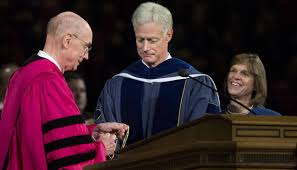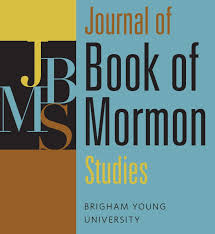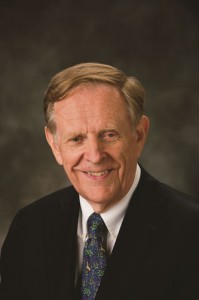It has been a few weeks now since BYU inaugurated its new president, in an event presided over by President Monson, conducted by Elder Nelson, with President Eyring performing the actual inauguration. Unless my memory is failing me (always possible) this inauguration considerably surpassed earlier BYU inaugurations, at least of recent memory, in pomp and ceremony. Now, I’m in favor of pomp and ceremony, and it is certainly appropriate to solemnize such an inauguration with the requisite dose of grave music, heartfelt tributes, colorful academic robes, and even the medal that was hung around President Worthen’s neck. And I should say immediately that I have the greatest respect for President Worthen as a scholar, a Latter-day Saint, and a person. (He was President of our Sharon East Stake not long ago, at a time when I got to see the Stake President fairly frequently. He is a good man, a sensitive and discerning reader of scripture, and a humble and effective leader. And no, I was not seeing him about disciplinary matters concerning me. That I recall.) I wish him the best and have no doubts either about his motives, his faithfulness to BYU’s highest purposes, or his competence. That is: I support him warmly as BYU’s new president.
That said, the Inaugural ceremony left me with some concerns – well, the same concerns I’ve (notoriously) expressed elsewhere. (See First Things Magazine, March 2014: “Keeping Faith in Provo.”)
The proper pomp and ceremony are inseparable from an emphasis on uplift and a certain degree of self-congratulation. This much is to be expected. Still, I would have appreciated a moment or two of relief from the uplift to at least allude to the very significant – I would say daunting – challenges that BYU is facing. And the fact that so few seem to be aware of these daunting challenges is a big part of what makes them daunting.
President Worthen’s theme of “going to the mountains” to achieve inspiration and an elevated (“ethereal”) perspective on our daily duties was a suitable reminder, and it would be unreasonable to expect a lot of elaboration on this theme on such a ceremonial occasion. Interestingly, President Eyring spoke of “crises” that President Worthen could face, but he did not specify at all and seemed mainly to reassure the new President that such things would pass.
The question that was understandably overlooked amidst all this uplift and self-congratulation concerning BYU’s recognized “greatness” as university, its “upward” momentum on a “steady path of progress,” it’s already achieved (“expected,” not merely sought) “excellence,” is the simple question: how do we define “greatness” “Excellence” — by what measure? “Progress” – towards what, exactly?
The use of these terms as if their meaning was self-evident plainly suggests that our idea of greatness, excellence and progress are, well, self-evident, that is, they mean what everyone else thinks they mean. We measure our excellence according to standards we share with other universities and with the academic professions. After all, if waste time asking what “success” means, you’re not going to be very successful, are you?
To be sure, all speakers were very clear that BYU is different and special – we are concerned not only with information but with inspiration, with cultivating the spiritual side of humanity, with fulfilling the whole human person. But none troubled us BYU supporters and employees in our assumption that such spiritual fulfillment can simply be added to the worldly success by which we measure our “excellence” and “greatness.” Just be excellent as everyone defines excellence, and then top it off with spirituality! That seems to be our dominant formula.
This is certainly the dominant paradigm in faculty recruitment and development at BYU: the process is wholly driven by conventional academic standards – a good faculty member is one who publishes in the journals deemed best by … the best journals, professional associations, etc. – and then of course they must be good Church members (as certified by a temple recommend), and look for opportunities to add something “spiritual” to the mix in their classrooms. But this “spiritual” element must always be an add-on, not to say an afterthought, since our understanding of “the spiritual” has not been part of any prior reflection on just what academic or intellectual excellence means. We simply adopt a view of humanity and of society from the allegedly scientific disciplines, and then we superimpose some spiritual edification — rarely asking whether the secular academic view of humanity and the “spiritual” edification are fundamentally compatible.
President Kimball (as I noted in my First Things article) was much less trusting of the general intellectual and academic environment in his Second Century Address (1975):
… Freedom from worldly ideologies and concepts unshackles man far more than he knows. It is the truth that sets men free. BYU, in its second century, must become the last remaining bastion of resistance to the invading ideologies that seek control of curriculum as well as classroom. We do not resist such ideas because we fear them, but because they are false. BYU, in its second century, must continue to resist false fashions in education, staying with those basic principles that have proved right and have guided good men and women and good universities over the centuries. …
We are, to say the least, much more comfortable on the upward path of progress towards ever great excellence than was President Kimball in 1975. Is this because the “false fashions in education” have been routed and are no longer a concern? Or have certain fashions, with their own largely implicit assumptions about human nature and human fulfillment, simply become a part of our understanding of “excellence”?
It would be comforting to imagine that the secular academy is governed by no particular understanding of human nature or of intellectual excellence, and that we can adopt its definition of “success” without any risk, prepared then to add our own idea of “spirituality” to the mix. It is always comforting to think that the meaning of “success” is obvious and requires no scrutiny.
(To be continued.)












